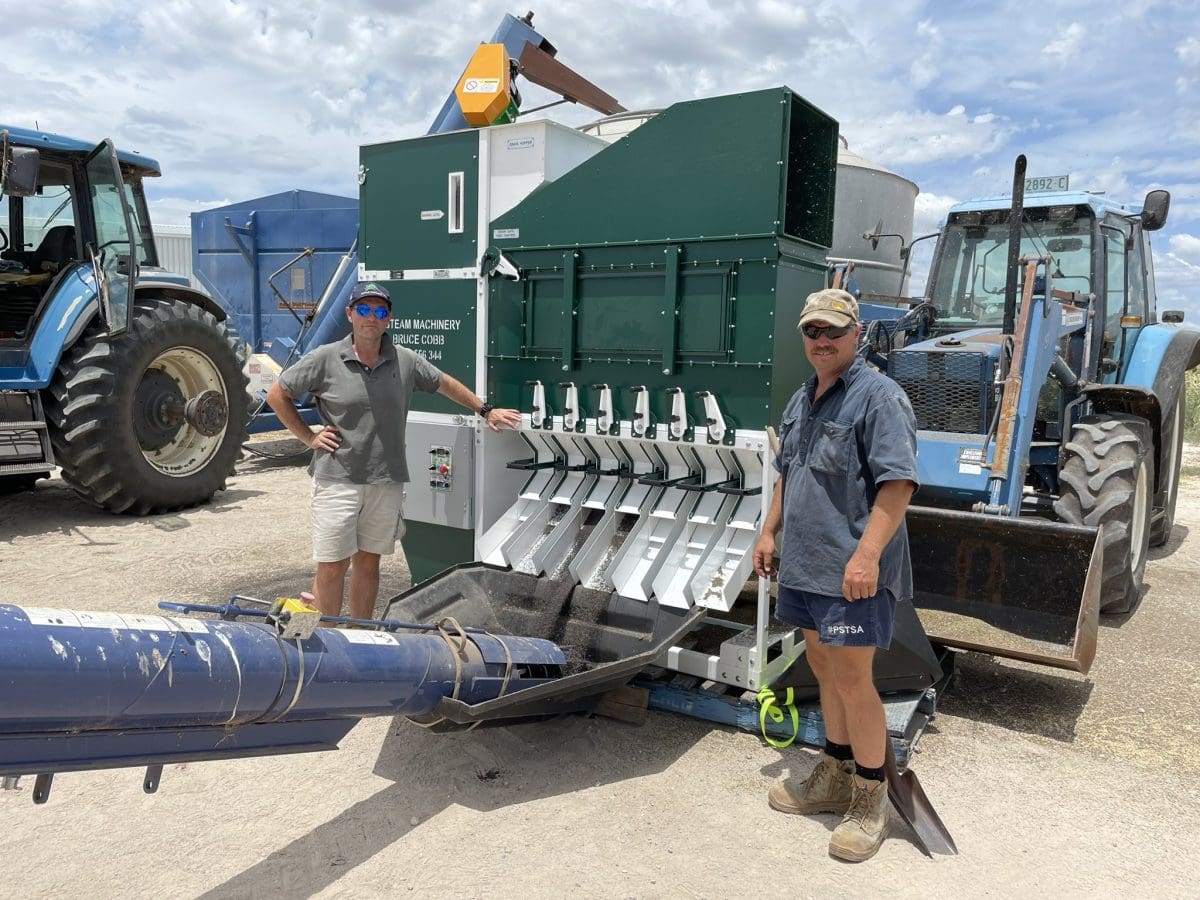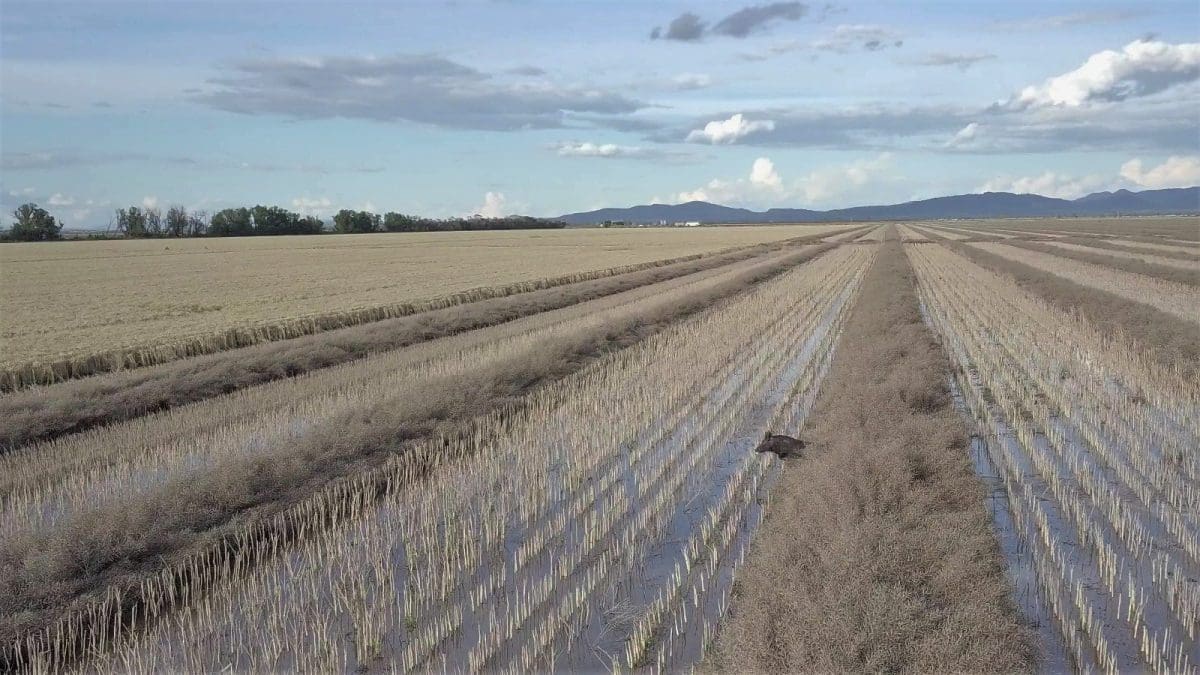
Liverpool Plains brothers Dale and James Kirby with air-operated seed cleaner which they bought after speaking with Mullaley brothers Anthony and Peter Martin about their experience. machine. Photo: Bruce Cobb
AN AIR-OPERATED seed cleaner looks like paying for itself in its first season for Liverpool Plains brothers Anthony and Peter Martin, who were hit hard by the waterlogged end to the 2021 growing season.
The ISM 30T unit has already been used to grade 300 tonnes of canola, some of which came from crops that had fish swimming through them when the flood was at its peak of one metre or more.
The brothers, who farm separately in the Mullaley district, are expecting to grade another 300t with the unit before moving on to shot and sprung wheat.
Anthony said he and Peter bought the unit in order to get their canola into the top grade, which demands a minimum test weight of 62 kilograms per hectolitre, and has a maximum tolerance for soil of 0.1 per cent.
Without hitting both parameters, a dockage of around 10 per cent was likely on a portion of for what Anthony alone was 1000 tonnes grown from 350 hectares planted.
“That was a very good yield, and we grew more than we harvested.”
Mr Martin said some windrows got washed away in a couple of spots, and sprouting was visible in others.
Their ungraded samples included dirt brought down with the flood and some sprouted seed, and weighed in at around 59-60kg/hl.
With admixture problems as well, they were not eligible for CAN1, which has been worth more than $800/t delivered port since spring.
“The crux for us came when we were fiddling around with costings per grade and realised receival points were not going to take the dirt.”
“We had to get the dirt out.”
The Martin’s uncle Kevin used an air separator 20 years ago to grade mungbeans on his farm at Mullaley, and it came to mind when the brothers were looking for a way to get their seed into the top segregation.
Newton’s law at work
The unit works on Newton’s second law of motion: force equals mass times acceleration.
What that means is a fan blows the seed, according to weight, into a series of adjustable outlets, with the heaviest material falling into the first, and the lightest to the furthest.
“It’s a matter of spacing outlets as the grain comes out to get it to do what you want it to do.”
The Martin brothers bought it in the first week of December after two or three weeks of rain.
“We put it to work straight away.”
The Martins used a screen to capture the dirt and let the canola fall through in the first outlet, and the outlet furthest from the fan collected the sprouted canola.
“I put 100t through and Peter put 200t through, and between us we’ll put another 300t through.”
Anthony said the lightweight canola which blew into the last couple of chutes is yet to find a home.
“At the moment, we can’t give it away.”
Animal feeders are expected to step up in coming months on the downgraded canola.
When combined with marketing strategies, Mr Martin said the exercise has already added value to the canola from both farms.
“It’s a minimum $100/t we’ve made.”
The unit cost $25,000, and can grade 12-25t per hour, depending on the commodity behind handled.
“We haven’t fully investigated on wheat, but it could help us get up one grade.”
As with most growers in NSW, the Martins have wheat with falling numbers well below the 300 seconds needed to make sound grades.
“For the stuff around 170, we might be able to get that up a grade.”
Word gets around
Brothers Dale and James Kirby farm in the Curlewis district not far from Mullaley, and had similar problems with their canola, as rain and flooding caused mould to grow in some windrows, and brought dirt into their seed.
They have bought the same-sized unit as the Martins, and took delivery this month.
“We bought it after talking to Anthony and Peter,” Dale Kirby said.
“We were looking at hiring one but we couldn’t find one.”
“For us to take it to a commercial cleaner would be $100/t in freight and cleaning, so you don’t have to clean too much before it pays for itself.”

Windrowed canola, complete with a visiting feral pig, in one of the Kirby family’s waterlogged paddocks near the Mooki River on the Liverpool Plains in November last year. Photo: Dale Kirby
They have put a separate screen in to take out bigger material between the auger and the cleaner’s hopper.
“The cleaner the sample going into the air cleaner, the better.”
Dale said today’s decentralised marketing system means growers are incentivised to maximise returns on farm for every tonne that heads out the gate.
“We can’t dump poorer stuff into a pool and let it average out.
“Anything we can do on farm to add value has got to be a good thing.”
National market
Both units were purchased through Bruce Cobb of Agteam Machinery at Kyabram, who has been importing them from Ukraine for several years.
They come in a variety of sizes, and Mr Cobb has sold them into every mainland state.
He said he went from importing single units to container loads “in a flash”.
“Some guys want to do 5t an hour, and others are up to 100t/hr.”
“There’s a demand not just for increasing grain weight for selling but for bigger seed for sowing as well.”
Grain Central: Get our free cropping news straight to your inbox – Click here

HAVE YOUR SAY